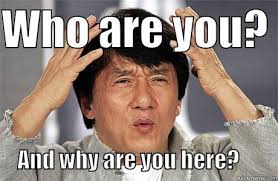by Ross Bishop
Like most people, you have probably wondered why you were here. After all, what is the purpose of all this? You are one of the most magnificent creations of The Universe, and it seems that you should have a greater purpose than to simply be born, work for 40 years, raise a couple of kids and then die. Doesn’t it seem that there should be more to it all?

Well, you’re not alone. Many people feel that there is something more to life, but they cannot quite touch what that something is. We long for peace and contentment and yet, there is a gnawing feeling that even though they can’t put their finger on it, there is more going on.
The truth is, there is a lot more happening than appears on the surface. However, it is difficult to get a perspective on this larger view. What most people experience as life is really window dressing for a much deeper and more fundamental process.
That process stated simply, is to heal the vulnerabilities in yourself that cause you to be afraid and keep you from living with compassion, in a state of grace. I am speaking of compassion for others of course, but most importantly, I mean compassion for yourself. And life becomes troublesome when you resist what is being asked of you. Allow me to explain:
This all started before you were born. You came to earth to resolve certain unfinished aspects of your beingness (usually about the love of self, feeling worthless and a desire for contentment). But because you have free will, you cannot simply be given these things. You must come to realize them for yourself.
What we call the “soul” or your “higher self,” brought in these issues for you to work on. But your incompleteness makes you feel inadequate and that in turn, leads to the creation of a set of beliefs (which are all false). Without realizing it, your parents (who were specifically selected for you) stumbled into your unfinished and sensitive parts. And your experiences with them led to the creation of a set of beliefs. “I am inadequate,” “I am worthless.” “I am unlovable.” But rather than simply being a place you needed to work on, these “soft spots” became flaws, weaknesses, vulnerabilities and inadequacies.
Childhood presents an interesting opportunity to observe the Principle of Perfection and how we regularly misinterpret it. Parents create environments to give children the opportunity to work through what the children came here for, and children bring to their parents the very things the parents need to work on. These just “happen” to be the flip side of every one of the children’s issues. That is the perfection of the process. When the lessons are learned, then each can move on, which we rarely do, however.
Have you noticed that very few people seem to have had easy childhoods? Does it not seem odd that with all the love people claim to have for their children they usually seem to mess up as parents? So, the child starts out believing the opposite of the truth, i.e. “I am not lovable,” “I am not worthy,” etc., to compensate for her inner feelings of “inadequacy.” You do not have the things you long for because you do not deserve them.
Looking at events from the inside can be deceiving. Childhood plays a most significant role in the process of our learning. It perfectly sets us up for the work we came here to do. Unfortunately, this is usually done with a good bit of pain and suffering as she struggles to resolve the dichotomy between Truth and what she has been led to believe.

And as you grew up, you learned to hide your flaws, or even better, hide behind your “inadequacies.” You became “unlovable,” to compensate for your feelings of unworthiness. You shut vital parts of yourself away because you were taught they were unacceptable or that you were bad for having them.
You closed this “inadequate” part of yourself off in order to not be hurt, criticized or embarrassed. As a result, you created a whole approach to life based on those beliefs. The resulting tumult was created to help you see the folly of your thinking.
But to you, it didn’t matter that your beliefs were totally untrue, that is where you were. There was this big “hole” in you that you didn’t dare let anyone see. And so the conflict grew and continued. Today you are understandably reluctant to mess with what you have come to believe because part of you believes it is true! And yet the longing for peace and contentment drags on your life like sea anchors.
Eventually, you will come to realize that the things you came to believe about yourself in childhood were false and that the only way you are going to escape from her dilemma is to learn to love yourself. Life gives you the opportunity to realize that no one else can provide the love and support you need and although other people can make life better, they do not make it good.
And this is God’s great game. An utterly innocent child carries, unbeknownst to her, a set of vulnerabilities to certain things such as lovability or worthiness. She experiences conflicts with those as she grows up. This leads to the creation of a set of beliefs – all untrue – that will cause her, in most cases, trouble in life. In fact, she will experience enough trouble that eventually she will confront the beliefs she has assumed, and discard them, holding by default the truth about herself and thus completing what The Creator put her here for.
Children fear the dark because it is unknown. We fear the unconscious because it is unfamiliar and foreboding. And since these aspects of ourselves are unfamiliar, we do not handle them well. We thrash about literally in the dark, grasping at shadows. We stumble, we fumble, we do not move with grace. We close the gates and pull up the drawbridge, close our eyes, stop breathing and hang on tight while the storm rages overhead.
By shutting vital aspects of ourselves away, we feel incomplete. We are caught between our feelings of incompleteness coupled with the belief that these are flaws of character. The combination leaves us feeling vulnerable to being “hurt” or “wounded.” The natural response to feeling worthless is fear. Being afraid, we draw upon our emotions to create a safe distance between ourselves and other people (potential threats). Our emotions are necessary until we are prepared to live from the truth.
The feelings that accompany our struggle are uncertainty, inadequacy, longing and vulnerability. When we drop into them we become defensive and can become most unkind. We push others away. We rage. We collapse. We are not willing to expose these areas of ourselves because we have been conditioned to believe that they are unacceptable.

And because of where we are, if we have even touched this place, we become uncomfortable. The unexplored shadow is an alien land where powerful and painful things happen. Fear is our contractive response to a strong energy we do not feel capable of managing.
The problem is, that the storm exists because of the poor decisions we made based on our fear. Today these parts are banging on the door, pleading to be let into the sunlight, but we cling tenaciously to the belief that we are unacceptable and keep the door closed.
Keeping the door shut requires a good deal of personal energy, which we experience as stress and tension. What is ironic is that our behaviors, based on our fear, cast a large spotlight on the very things we are trying to avoid exposing!
This is The Universe’s way of nudging us by calling attention to what we are doing. The process of life has been designed to bring our hurt and rejected aspects into the light, into consciousness, so that we might see them for what they really are, instead of what we fear them to be. The way this happens is that life will present us with conflicts – challenges that expose our false beliefs.
(excerpted from Healing The Shadow by Ross Bishop)
